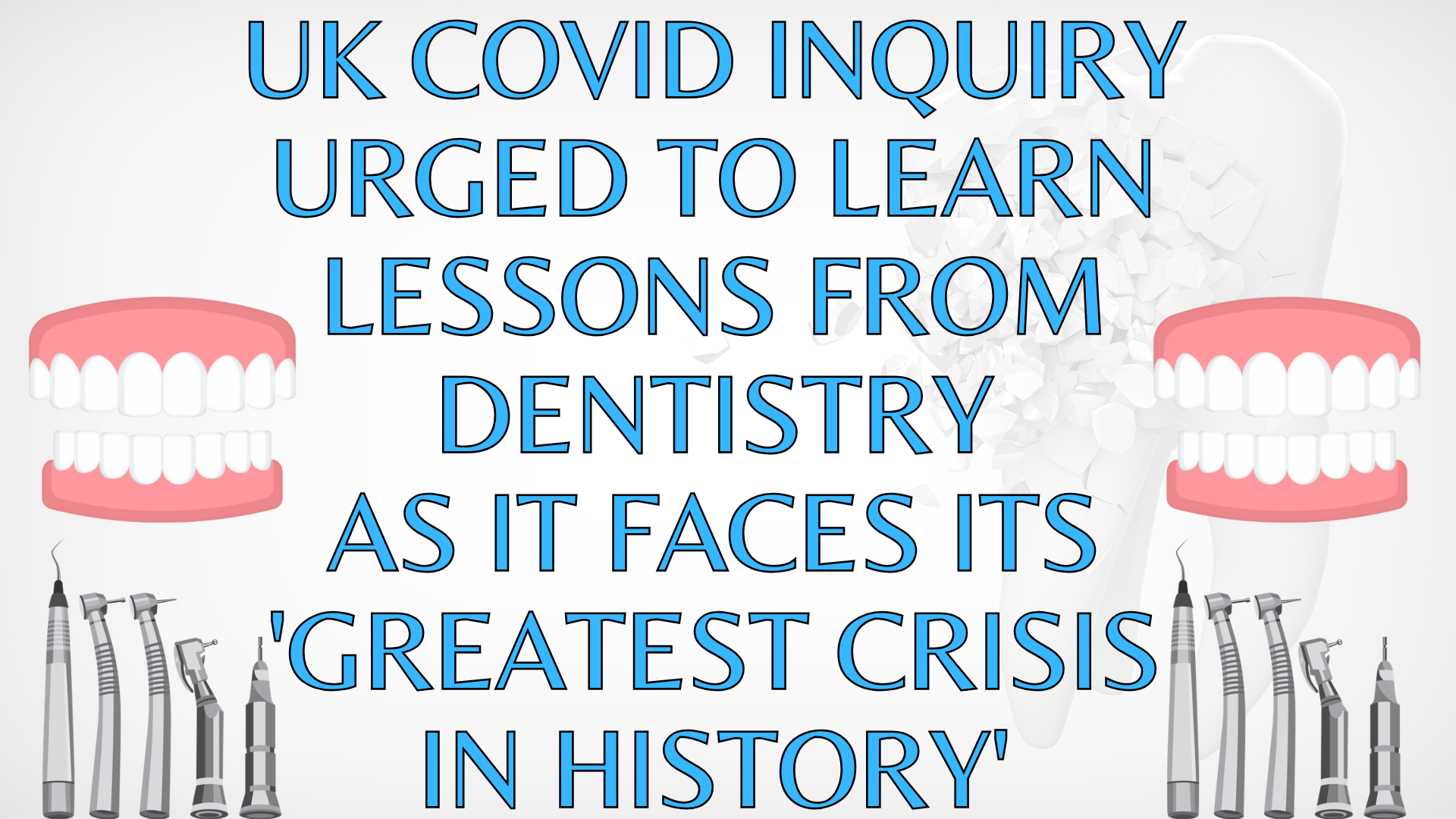UK Covid Inquiry urged to learn lessons from dentistry as it faces its ‘greatest crisis in history’
THE UK government’s refusal to listen to dentists’ pandemic concerns has led to record waiting lists and DIY tooth removal which has “no place in a wealthy 21st century nation”, the industry’s union has warned.

It says that there was a “fundamental failure” to heed warnings from dental experts before and during the pandemic which, combined with years of underfunding, has left the sector facing “the greatest crisis in its history”.
There are now “widespread dental deserts” across the country with more than 50 million appointments lost since lockdown – the equivalent of a year’s work. Currently, only three per cent of new patients applying for NHS treatment are successful.
The British Dental Association (BDA) has urged the Covid inquiry – which has so far mentioned dentists just twice in its hearings – to learn the lessons from the virus and not treat oral health as an “optional extra”.
It will take years to clear the waiting lists, it says, in new evidence sent to inquiry chair Baroness Hallett. This stands at 13 million people in England alone, meaning more than one in four adults is in need of treatment.
This is three times the level seen in 2019 and the industry is now seeing “regular” reports of DIY dentistry, which can include self removal of teeth.
It fears that oral cancers have also been missed, with the BDA warning this is a matter “of life and death”. There have also been reports of a surge in potentially dental sepsis cases presenting to hospital A@E departments.
A BDA analysis suggests that the pandemic had an impact on dentistry “with no parallel anywhere in healthcare, with the sharpest single fall in capacity, and the weakest recovery”.
It says that choices made by the Tory Government during the pandemic on suspension and restoration of services and the recovery left dentistry “lagging behind other parts of healthcare”.
The BDA said:
“Dentistry faced major problems before lockdown, but the pandemic proved a catalyst, and turbocharged them into a genuinely existential threat to the service.”
Yet despite the dire state of affairs, it says,
“dentistry does not even appear to be on the menu for this inquiry”. The hearing has made just two references to the sector so far and risks treating it as “an afterthought”
, the union claims.
It urges Baroness Hallett:
“This inquiry has a responsibility to ensure the mistakes of the past are not repeated, and that future pandemic responses avoid causing lasting collateral damage to core parts of our health service.”
As a whole, its evidence paints a bleak picture of both the state of the nation’s dental health and of the morale of the dentists who provide it.
Several have described Covid-19 as “the most challenging experience in their professional lives”, yet they were left underfunded, understaffed and with unprepared systems. PPE was also lacking and the messaging was confused, the BDA states.
“It is of critical importance that the Inquiry helps the UK to learn these lessons,” it says.
“Dentists provide an essential healthcare service, which was wrongly neglected during the pandemic, and the Inquiry must ensure that it does not continue this neglect.
“Dentistry matters, and the lessons learned here must not be overlooked.
“The pandemic led to unprecedented restrictions being placed on dental treatment, which impacted on both dental professionals and the patients they supported.
“Yet, as we will set out in this evidence, there was a fundamental failure to take dentistry seriously in both the planning for a pandemic and the response to it.”
BDA Chair Eddie Crouch said:
“The crisis millions now face is the result of political choices. If lessons are not learned we will see more collateral damage to core parts of our health service.”
The BDA accepted the case for the first lockdown although its members reported “uncertainty, fear and immense frustration” at the lack of information they were given.
A requirement to be officially signed off meant there were often “unnecessary bottlenecks” of days or even weeks before dentists were informed of the latest guidelines. When these did arrive, they were often “open to interpretation”.
But the main issue was the lack of inclusion of dentists and their role during the pandemic planning.
The evidence states that although the BDA were invited to attend a “small number” of meetings concerning preparation for a flu pandemic, the main focus was on delivering vaccines and deploying staff to other sectors.
When the pandemic transpired to be a coronavirus, with no vaccines available, it left dentists in the dark.
“A key learning point is that the, now well-documented, limited UK preparedness ahead of the pandemic never really fully considered dentistry,” the union says. It accuses the then-administration of a “chaotic approach” and “underlying disarray in decision-making”.
It points to the PPE shortage as an example. In February 2020, before Covid had truly hit the UK, dentists expressed concern over supply chain disruption. But despite them warning they may have to “down drills” as a result, this “was viewed by many senior health leaders within Government as an overreaction”.
In the event they were proved correct.
The BDA says:
“The ease with which the concerns of dentists – acting a canary in the coalmine – were dismissed is another example of the failure of senior decision-makers to take dentists and dentistry seriously.”
It makes a number of recommendations to the inquiry. One urges the hearing to give dentistry greater prominence in future pandemic preparation.
“Dentistry is not an ‘optional extra’”, it says.
“Dental teams are made up of key workers, providing an essential healthcare service to millions of patients every year.
“Maintaining good oral health is important for a person’s overall health. There are known links between oral health and diabetes management and cardiovascular health. Poor oral health is a risk factor in hospital-acquired pneumonia. Dental care is a core component of healthcare.
‘This can be a life-or-death issue. Oral cancers, often detected at a routine checkup, claim more lives than car accidents and ongoing access problems are jeopardising early detection. It is also translating into a reported spike in dental sepsis cases in our hospitals.
“Yet at many points during the pandemic, it felt like dentistry was overlooked.”
While other health sectors have made a recovery, dentistry is still languishing and the backlog of care “will take years to clear”. The UK had one of the largest falls in attendances among any developed nation.
The BDA recommends:
“Some of the choices made at the outset of the pandemic effectively categorised dentistry as a ‘non-essential’ service. This was a significant error and must be avoided in the future. As such, the Inquiry should consider how this lesson can most effectively be learnt and then applied in future pandemics.”
It also calls for robust strategies for the provisions of PPE to dentists in the event of future pandemics.
The union points out that although it provided an initial response to a series of questions set out by the inquiry, it has not been invited to give further evidence.
It says this risks making the same mistakes again should a new outbreak emerge. It also highlights the importance of looking at healthcare in the round, rather than focusing on the most visible systems.
“The BDA hopes this evidence will prompt further enquiry into dentistry during the pandemic,” it says.
“We believe that there is a tangible risk of ‘medicalising’ pandemic planning, and our core messages for the Inquiry and for pandemic planners is that it is critical that they engage with all health professionals and the wider support teams.”
It adds:
‘We feel that the focus of the Inquiry must be widened, so that the attention is not placed solely on those who have been appointed as core participants. Instead, the Inquiry must ensure that it looks comprehensively at the health system and how it was impacted by the pandemic. This will ensure that lessons are learned, not merely for dentistry, but the wider health service.”
UK dentistry was already under pressure before the emergence of the virus. NHS treatment in particular was facing a “significant crisis”.
Overlooking concerns of the sector during Covid-19 has exacerbated this underlying problem, the BDA warns.
It states;
“The narrative from the then-Government was that many of the challenges now facing NHS dentistry are an inevitable consequence of the pandemic.
“The reality is that the pandemic proved a catalyst, aggravating systemic and structural problems in an NHS service already facing a significant crisis.
“Choices made during the pandemic, rather than merely the existence of a pandemic, compounded these problems and left NHS dentistry, in particular, in the weakest state in its history.”
It calls for a new approach across the UK to tackle the issue of dental work on the NHS.
It says:
“NHS dentistry entered into the pandemic in a highly weakened state. In all four NHS systems, the contractual frameworks for NHS dentistry were not fit for purpose, and these broken contracts were further hamstrung by a decade of austerity.
:”This situation underscores the need for state capacity to address public policy problems with foresight, and of ensuring that health systems are not run down, but instead properly invested in. The aim of policy makers, in part, should be to ensure that systems are sufficiently resilient to withstand plausible crises. Instead, NHS dentistry has faced an approach of doing the bare minimum for the service to survive under favourable circumstances, and it is inevitable then that, when tested, NHS dentistry has been pushed to breaking point.”
Mr Crouch commented:
“No part of the health service took such a hit during the pandemic, and none has seen such a limited recovery. Yet dentistry isn’t even on the menu at this Inquiry.
“At lockdown, dentistry was treated like an optional extra. Subsequent failure to deliver needed reform turbocharged existing problems into a genuinely existential threat to the service.“The crisis millions now face is the result of political choices. If lessons are not learned we will see more collateral damage to core parts of our health service.”
The Covid Inquiry has been approached for comment.
